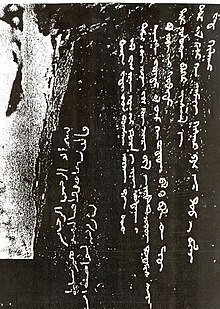Karsakpay inscription
Karsakpay inscription (also called the Timur's stone)[1] is a message carved on April 28, 1391[2] into the stony Ulu Tagh mountainside near the Karsakpay mines, Kazakhstan. It was found in 1935[3] or 1936.[4] It consists of three lines in Arabic, and eight lines in Chagatai, written in the Old Uyghur alphabet.[5]

The inscription mentions real events that took place in 1391, during Timur's campaign against Tokhtamysh of the Golden Horde, and the route that passed through the semi-desert regions of Betpak-Dala, past the Ulytau Mountain chain.
In Zafarnama (Book of Victories), written in the first quarter of the 15th century, its author Sharaf ad-Din Ali Yazdi presents the testimony about one historical episode of that campaign:
For a joyful survey of that steppe, Timur ascended to the top of the mountain, the whole plain was all green. He stayed there that day, (then) a high order came out, so that the soldiers brought stones and a high sign, like a lighthouse was put in that place. Master stonecutters inscribed on it the date of that day, so that to leave the reminder on the face of time.[6]
After its discovery, the Karsakpay inscription was taken to the Hermitage Museum of the then Leningrad (present-day St.Petersburg, Russia) in 1936,[7] where it is still kept today.[8]
Context
The inscription notes the crossing of Timur and his 200,000 men in pursuit of Tokhtamysh, a ruler of the Golden Horde from 1378 to 1395.[4] Timur asks those reading the inscription to remember him with a prayer.[9]
Complete text
|
Chagatai transliteration:[10]
|
Translation:[10]
|
Chagatai transliteration: (by International Turkic Academy)[3]
|
References
- Chemical-technological analysis of slags from the «Altynshoky» complex
- Ponomarev, A.I. (1945). Soviet Oriental Studies, Vol. III. Academy of Sciences of USSR. p. 222.
- Emir Temir'in Yazıtı (Karsakpay //Аltın Şokı anıtı), 1391. Karsakpay Anıtı. Petersburg, Devlet Ermitaj Sergisi Karsakpay Anıtı. N.N.Poppe
- Edward A. Allworth, (1950), The Modern Uzbeks: From the 14th Century to the Present, p. 215
- Grigoryev A.P., (2004), Historiography and source study of the history of the countries of Asia and Africa, p. 3-24
- Tizengauzen, V. G. (1941). Sbornik marerialov, otnosiashchikhsia k istorii Zolotoi Ordy [Collection of materials related to the history of the Golden Horde. (Vol. 2). Moscow; Leningrad: Publishing house of the Academy of Sciences of the USSR [in Russian].
- Ponomarev, A.I. (1945). Soviet Oriental Studies, Vol. III. Academy of Sciences of USSR. p. 222.
- Trever, K.V.; Yakubovskiy, A.Y.; Voronets, M.E. History of the Peoples of Uzbekistan. Academy of Sciences of Uzbek SSR. p. 355.
- Paul Brummell, (2018), Kazakhstan, p. 203
- Silkroads World Heritage: A mysterious stone of Timur, 8 Nov 2016